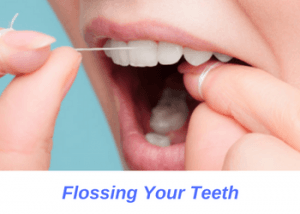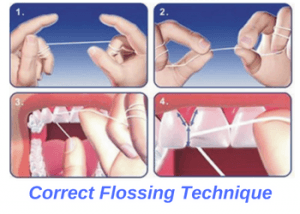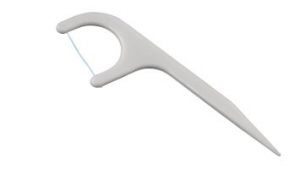Why is flossing your teeth important?
Flossing is very important to the long-term health of your teeth and gums. In fact, flossing your teeth is just as important as brushing them. Flossing thoroughly cleans the surfaces between your teeth. Brushing alone cannot clean these areas and leaves food particles trapped between the teeth. If you’re not flossing your teeth, you’re not removing food particles from in-between the teeth. This may lead to cavity formation between the teeth, known as interproximal cavities, as well as gum disease.

Flossing thoroughly cleans the surfaces in-between your teeth
What is the correct way to floss your teeth?
Flossing your teeth the correct way requires practice and patience. Start by grabbing a long enough piece of dental floss thread. Ideally, use a 12 to 18-inch piece of floss string. Roll the floss firmly around your two index fingers, making sure to get a tight grip on the string. Pass the dental floss carefully through each gap between the teeth. As you go in, carefully wiggle the floss left and right against the adjacent teeth surfaces. Remove the plaque that is gathered between the teeth surfaces. Once you finish cleaning one gap, re-position the floss and start cleaning the next gap. Continue until all surfaces between your teeth have been properly cleaned.

Flossing your teeth the correct way takes practice and should not be rushed
Are floss picks as effective as regular dental floss?
No! Floss picks are not nearly as effective as traditional dental floss. Do not substitute a handheld floss pick for your daily flossing routine. However, floss picks are an acceptable supplement to your daily hygiene routine. Especially for times when you can't get a hold of dental floss. Floss picks are ideal for use at work, on lunch breaks, and when you're out and about. The only exception is for those who are incapable of using dental floss due to some sort of disability. This includes those suffering from chronic arthritis pain, carpal tunnel syndrome, and others with manual dexterity difficulties. In these situations, it's acceptable to use a floss pick in place of traditional dental floss.

Floss picks should not be used as a substitute for dental floss
Is it a bad sign if your gums bleed when you floss them?
Bleeding gums are a common sign of gum disease. If your gums are bleeding, you're most likely due a cleaning. Schedule an appointment with your dentist to have your gums evaluated and get them cleaned. What if your gums continue to bleed even after your dental cleaning? You may have to give it some time to see if the bleeding goes away. Continue flossing your teeth daily using the correct flossing techniques. Your gum bleeding should slow down and stop after a month. This is a sign that your gums are healing and your gum disease is under control. If your gums continue to bleed without showing signs of improvement, then you should schedule a follow-up with your dentist. Maybe you need a more thorough cleaning, like a deep cleaning. You might need medications or more advanced gum treatments. Schedule a follow-up with your dentist to have your gums evaluated one more time.
If you'd like to learn more about cleaning your teeth and gums, click on one of the following links: